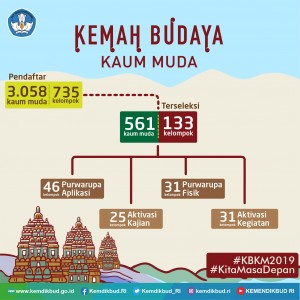Culture Minister: Youth Collaboration is Crucial to Promote Culture
 Indonesian youth possesses an important role in promoting culture, especially in the industrial era 4.0, Minister of Education and Culture Muhadjir Effendy has stated.
Indonesian youth possesses an important role in promoting culture, especially in the industrial era 4.0, Minister of Education and Culture Muhadjir Effendy has stated.
“Cultural development depends on you all,” Muhadjir said at the opening of the Kemah Budaya Kaum Muda (Youth Culture Camp) in the courtyard of Prambanan Temple, Sleman, Special Region of Yogyakarta, Sunday (21/7).
The Minister stated that the event can serve as a starting point in advancing Indonesian culture. Therefore, he asked the participants to exchange good experiences, work together, and build networks to promote national culture. In addition, he expressed hope that the competition during the camp can foster the spirit of collaboration.
“Indonesia will become a strong country and an advanced nation if the youth does not just prioritize competition but also attempts to develop collaboration, togetherness and network throughout the country,” Muhadjir said.
Director-General of Culture Hilmar Farid on the occasion explained that the Kemah Budaya Kaum Muda which adopting the theme ‘Kaum Muda Berkarya, Indonesia Bahagia (Working Youth, Happy Indonesia)’ is expected to find a shared solution to the challenges of promoting culture in their respective regions. The camp was held on 21-25 July 2019 and involved youth aged 18-28 years.
The camp was participated by 561 people, divided into 132 groups from 28 provinces. There were also four major groups in the camp representing big ideas which were expected to be a solution to the challenges in promoting culture, namely application prototype (46 groups), physical prototype (31 groups), activation of studies (25 groups), and activation of activities (31 groups).
The participants were given a series of problem written in the Principal Thought of Regional Culture (PPKD) then they need to discuss solutions to the problems using science, technology, engineering, art, and mathematics (STEAM).
“We are trying to encourage the innovation of these youngsters. They will later meet with others who have similar passion and concern regarding the promotion of culture,” Hilmar said.
For the records, each participating group was assisted by a facilitator team to boost their interactions and collaboration. Then, each group presented their ideas before the jury on 23-24 July 2019. Afterward, 12 best groups were selected to receive assistances from Ministry of Education and Culture to actualize their projects.
Those 12 best groups are as follows:
Application Prototype:
- Wawara Project (East Java)
- Permata (West Java)
- Ken Arok (East Java)
Physical Prototype:
- Kosikopat (Riau Islands)
- Lasinrang Youth (South Sulawesi)
- Storia Karacitra (West Java)
Activation of Studies:
- Sungai Kita (West Java)
- Kata Kerja (South Sulawesi)
- Sitasinattaoi (Nias Island, North Sumatra and Mentawai, West Sumatra)
Activation of Activities:
- Sangar Rojolele (Central Java)
- Tinung Rimbu (East Sumba, East Nusa Tenggara)
- Garudeya (East Java).
During the closing of the camp, the participants read out a ten point Action Call aimed at all cultural stakeholders, especially Indonesian youth. The Action Call, that was drawn up based on three days interaction and discussion, contains the participants’ determination to advance Indonesian culture through cross-disciplinary collaboration.
“We are ready to work and oversee the realization of the Action Call so that there will be a new Prambanan (a metaphor of prominent cultural symbol), as a foundation for Happy Indonesia,” the participants promised. (Minister of Education and Culture PR/ES)
Translated by : Fairuzzamani Inayatillah
Edited by : Estu Widyamurti, Mia M. Bonaedy








